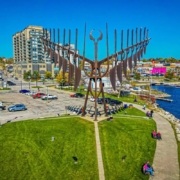Airbnb Regulation in Montreal – 2023 Overview
The rise of short-term rental platforms like Airbnb has transformed the way people travel and has created new opportunities for property owners to earn extra income. Montreal is one of the cities that has embraced this trend and has become a popular destination for tourists. However, the growth of Airbnb has also led to new regulations aimed at controlling the short-term rental industry. This article provides an overview of the Airbnb regulations in Montreal and what property owners need to know to comply with the law.
Explore Why Airbnb in Montreal is a great investment.
Airbnb Licensing Montreal
The first step in complying with Airbnb regulations in Montreal is obtaining a license. All property owners who want to list their properties on Airbnb must obtain a business license. This license is issued by the city of Montreal and is a requirement under the city’s short-term rental regulations.
Short-term Rental Regulation for Hosts
To be in compliance with short-term rental regulations, hosts must adhere to a set of rules set out by the city of Montreal. Some of the key rules include:
- Listing only one property: Hosts are only allowed to list one property on Airbnb. If a host has multiple properties, they must choose which one they want to list.
- Maximum number of guests: Hosts must abide by a maximum number of guests that can stay in their properties. This number is set by the city of Montreal and is based on the size and location of the property.
- Required insurance: Hosts must have insurance coverage for their properties. This insurance must cover any damage caused by guests during their stay.
- Payment of taxes: Hosts must pay taxes on the income they earn from their Airbnb listings. This includes local taxes, such as the hotel tax, as well as any federal taxes that may apply.
- Inspections: Hosts must allow city inspectors to inspect their properties at any time. This is to ensure that their properties are safe and in compliance with the city’s short-term rental regulations.
Airbnb Regulation in Montreal
In addition to the rules for hosts, there are also regulations for Airbnb itself. These regulations include:
- Verification of listings: Airbnb must verify that all listings on its platform are in compliance with the city’s short-term rental regulations. This includes checking that the property has a valid business license and that the host has the required insurance coverage.
- Removal of illegal listings: Airbnb must remove any listings that are found to be in violation of the city’s short-term rental regulations. This includes listings that are not licensed, exceed the maximum number of guests, or do not have the required insurance coverage.
- Cooperation with the city: Airbnb must cooperate with the city of Montreal in enforcing short-term rental regulations. This includes providing information about listings to the city and removing illegal listings as required.
Penalties for Non-Compliance in Montreal
Hosts who violate the short-term rental regulations in Montreal face penalties, including fines and the removal of their listings from Airbnb. The city of Montreal takes these regulations seriously and will take action against hosts who do not comply.
In addition to the penalties imposed by the city, hosts who violate the regulations may also face consequences from Airbnb itself. Airbnb has a zero-tolerance policy for hosts who violate the city’s regulations and may remove their listings from the platform and ban them from using the service in the future.
Impact on the Housing Market in Montreal
The rise of short-term rentals has had an impact on the housing market in Montreal, as some property owners have chosen to rent out their properties on Airbnb instead of long-term tenants. This has led to concerns about the availability of affordable housing for residents and has contributed to the city’s decision to regulate the short-term rental industry.
However, the regulations in Montreal are designed to strike a balance between the benefits of short-term rentals and the need to protect the housing market. By requiring hosts to obtain a license, pay taxes, and comply with a set of rules, the city is able to control the growth of the short-term rental industry and prevent it from having a negative impact on the housing market.
Support for Hosts in Montreal
The city of Montreal supports hosts who want to comply with short-term rental regulations. This includes information and resources on the city’s website, as well as assistance with obtaining a business license and navigating the regulations.
Hosts can also turn to Airbnb for support in complying with the regulations. Airbnb provides information on the regulations in Montreal and can assist hosts in verifying their listings and making sure they comply with the law.
Conclusion
The regulations on short-term rentals in Montreal are designed to balance the benefits of Airbnb with the need to protect the city’s housing market and communities. Hosts who want to use Airbnb to rent out their properties must be aware of these regulations and take steps to comply with the law. With the support of the city and Airbnb, hosts can easily comply with the regulations and enjoy the benefits of short-term rentals.
Read also about Airbnb Regulations in Ottawa 2023.












